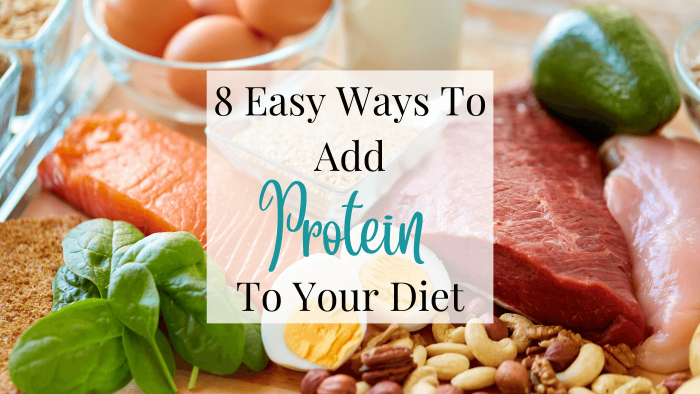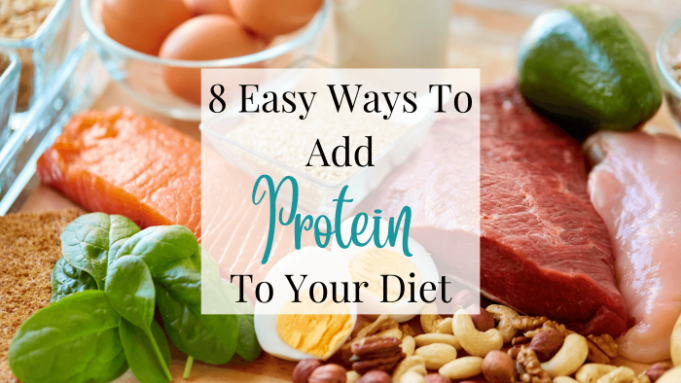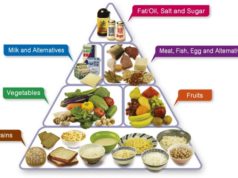Ways to add protein to diet – Ways to add protein to your diet are essential for building and maintaining muscle, supporting overall health, and managing weight. Protein is a vital nutrient that plays a crucial role in numerous bodily functions, and ensuring adequate intake is crucial for optimal well-being.
From lean meats and fish to plant-based options like beans and tofu, there are countless delicious and nutritious ways to incorporate protein into your daily meals and snacks. This guide will explore various strategies for increasing your protein intake, including tips for incorporating protein into different meal types, understanding the benefits of different protein sources, and navigating the world of protein supplements.
Understanding Protein Needs
Protein is an essential nutrient that plays a vital role in many bodily functions. It’s a building block for muscles, bones, skin, and hair. It also helps make enzymes, hormones, and antibodies that are crucial for immune function. Getting enough protein is essential for optimal health and well-being.
Recommended Daily Protein Intake
The recommended daily protein intake varies depending on age, gender, and activity level. Here’s a general guideline:
For adults, the recommended daily protein intake is 0.8 grams per kilogram of body weight (0.36 grams per pound).
For example, a 150-pound adult would need about 54 grams of protein per day. However, this is just a general guideline, and individual needs may vary.
- Age: As we age, our protein needs may increase slightly to support muscle mass and bone health. Older adults might need around 1.0 to 1.2 grams of protein per kilogram of body weight per day.
- Gender: Men generally need slightly more protein than women due to their larger muscle mass.
- Activity Level: Athletes and people who engage in regular, intense exercise need more protein to support muscle growth and repair. The recommended daily protein intake for athletes ranges from 1.2 to 1.7 grams per kilogram of body weight per day.
Protein for Muscle Growth and Repair
Protein is essential for muscle growth and repair. During exercise, muscle fibers are broken down, and protein is needed to rebuild and repair them. Consuming adequate protein after exercise can help promote muscle protein synthesis and enhance recovery.
Benefits of Protein for Overall Health
Protein provides numerous health benefits beyond muscle growth and repair:
- Weight Management: Protein can help with weight management by increasing satiety and reducing hunger. This is because protein takes longer to digest than carbohydrates or fats, keeping you feeling full for longer. Protein can also boost metabolism and help burn more calories.
- Satiety: Protein promotes feelings of fullness, which can help you eat less overall and avoid overeating.
- Blood Sugar Control: Protein helps regulate blood sugar levels by slowing down the absorption of glucose from the digestive system. This can help prevent spikes in blood sugar and improve insulin sensitivity.
High-Protein Foods
A balanced diet rich in protein is essential for maintaining overall health and well-being. Protein is a vital macronutrient that plays a crucial role in building and repairing tissues, producing enzymes and hormones, and supporting a healthy immune system. While there are various protein sources available, it’s important to include a diverse range of options to ensure you’re getting a complete spectrum of essential amino acids.
High-Protein Food Sources
Incorporating various protein sources into your diet offers numerous benefits, including increased nutrient diversity. By choosing a mix of lean meats, poultry, fish, legumes, and plant-based options, you can obtain a wider range of vitamins, minerals, and antioxidants. This approach not only enhances your nutritional intake but also promotes satiety, helping you manage your weight and maintain energy levels throughout the day.
| Food Category | Example Foods | Protein Content per Serving (grams) | Tips for Preparation |
|---|---|---|---|
| Lean Meats | Chicken Breast, Turkey Breast, Lean Beef, Pork Tenderloin | 25-30 grams | Grill, bake, or roast for a healthy and flavorful option. |
| Fish | Salmon, Tuna, Cod, Shrimp | 20-30 grams | Bake, grill, or pan-fry with minimal oil. |
| Legumes | Lentils, Black Beans, Kidney Beans, Chickpeas | 15-20 grams | Add to soups, stews, salads, or use as a base for veggie burgers. |
| Tofu | Firm, Medium, Soft | 20-30 grams | Marinate and pan-fry, bake, or grill for a versatile protein source. |
| Eggs | Whole Eggs, Egg Whites | 6-8 grams per egg | Scramble, fry, poach, or hard-boil for a quick and easy breakfast option. |
| Dairy | Greek Yogurt, Cottage Cheese, Milk | 15-20 grams | Enjoy plain or add to smoothies, dips, or sauces. |
| Nuts and Seeds | Almonds, Walnuts, Chia Seeds, Flax Seeds | 5-10 grams | Add to trail mixes, yogurt, or granola for a healthy snack. |
Incorporating Protein into Meals: Ways To Add Protein To Diet
It’s important to distribute protein throughout your day, not just focusing on large amounts at one meal. This ensures a steady supply of amino acids for muscle repair, growth, and overall well-being.
Sample Meal Plan, Ways to add protein to diet
A well-balanced meal plan can help you meet your daily protein needs. Here’s a sample plan for a day:
Breakfast
- Greek yogurt with berries and granola (20 grams protein)
- Scrambled eggs with spinach and whole-wheat toast (25 grams protein)
- Overnight oats with protein powder and nuts (20 grams protein)
Lunch
- Tuna salad sandwich on whole-wheat bread (30 grams protein)
- Lentil soup with a side of whole-grain crackers (20 grams protein)
- Chicken salad with mixed greens and avocado (35 grams protein)
Dinner
- Salmon with roasted vegetables and quinoa (30 grams protein)
- Chicken stir-fry with brown rice (35 grams protein)
- Lentil and vegetable curry with brown rice (25 grams protein)
Snacks
- Greek yogurt with fruit and nuts (15 grams protein)
- Hard-boiled eggs (6 grams protein per egg)
- Protein bar or shake (20-30 grams protein)
Visual Representation of a Plate
Imagine a plate divided into four sections.
- The largest section should be filled with vegetables and fruits, providing essential vitamins, minerals, and fiber.
- The next largest section should be dedicated to whole grains, such as brown rice, quinoa, or whole-wheat bread, offering complex carbohydrates and fiber.
- The third section, slightly smaller than the grain section, should be filled with protein sources like lean meat, poultry, fish, beans, lentils, tofu, or eggs.
- The smallest section, representing a small handful, should be filled with healthy fats like nuts, seeds, avocado, or olive oil.
Creative Ideas for Adding Protein
Smoothies
- Add protein powder, Greek yogurt, or nut butter for a boost.
- Incorporate protein-rich ingredients like chia seeds, hemp seeds, or tofu.
- Use protein-packed fruits like berries, bananas, or mangoes.
Salads
- Top salads with grilled chicken, fish, or tofu.
- Add beans, lentils, or chickpeas for extra protein and fiber.
- Use protein-rich dressings like tahini or hummus.
Soups
- Include lentils, beans, or chickpeas for a hearty and protein-rich soup.
- Add shredded chicken, ground turkey, or fish to boost protein content.
- Use protein-rich ingredients like quinoa or barley for a complete meal.
Protein Supplements

Protein supplements are concentrated sources of protein that can be a convenient way to increase your daily intake. They are popular among athletes, bodybuilders, and individuals seeking to boost their protein intake for various reasons.
Types of Protein Supplements
Protein supplements come in various forms, each with unique properties and benefits. Here are some common types:
- Whey Protein: Whey protein is derived from milk and is a complete protein, meaning it contains all nine essential amino acids. It is quickly absorbed by the body, making it a popular choice for post-workout recovery. Whey protein is also available in different forms, including whey protein isolate, whey protein concentrate, and hydrolyzed whey protein, each with varying levels of protein content and processing.
- Casein Protein: Casein protein is also derived from milk but digests more slowly than whey protein. It provides a sustained release of amino acids into the bloodstream, making it suitable for nighttime consumption to support muscle growth and recovery while you sleep.
- Soy Protein: Soy protein is a plant-based protein source that is complete and contains all essential amino acids. It is a good option for individuals with dairy allergies or who prefer a plant-based diet. Soy protein is often used in protein bars, shakes, and other supplements.
- Plant-Based Protein Powders: With the growing popularity of plant-based diets, various plant-based protein powders have emerged. These powders are typically derived from sources like pea protein, brown rice protein, hemp protein, and quinoa protein. While some plant-based proteins may not be complete, they can still be valuable additions to a balanced diet.
Benefits of Protein Supplements
Protein supplements can offer several potential benefits, including:
- Increased Protein Intake: Protein supplements provide a convenient way to increase your protein intake, especially if you struggle to meet your daily requirements through diet alone. This is particularly helpful for individuals with high protein needs, such as athletes and those trying to build muscle.
- Muscle Growth and Repair: Protein is essential for muscle growth and repair. Protein supplements can help support muscle protein synthesis, especially after exercise. This can be beneficial for individuals seeking to gain muscle mass or improve athletic performance.
- Weight Management: Protein can help promote satiety and reduce hunger, making it a valuable tool for weight management. Protein supplements can help you feel fuller for longer, potentially leading to reduced calorie intake.
- Improved Bone Health: Protein plays a role in maintaining bone health. Some studies suggest that protein supplements may help improve bone density, particularly in older adults.
Drawbacks of Protein Supplements
While protein supplements can be beneficial, it is essential to consider their potential drawbacks:
- Potential Side Effects: Some individuals may experience side effects from protein supplements, such as digestive issues, bloating, or gas. These side effects are typically mild and often resolve with time. It is crucial to start with a small amount and gradually increase your intake to minimize the risk of side effects.
- Cost: Protein supplements can be relatively expensive, especially compared to other protein sources. This can be a significant factor for individuals on a tight budget.
- Dependence: Relying solely on protein supplements for your protein intake can lead to a dependence on them. It is crucial to prioritize whole food sources of protein and use supplements as a complement, not a replacement.
- Kidney Strain: While more research is needed, some studies suggest that high protein intake, including from supplements, may put a strain on the kidneys. Individuals with pre-existing kidney conditions should consult with their doctor before using protein supplements.
Choosing the Right Protein Supplement
Choosing the right protein supplement depends on your individual needs and goals. Here are some factors to consider:
- Protein Source: Consider your dietary preferences and any allergies or intolerances when choosing a protein source. Whey protein is a popular choice for athletes, while soy protein is a good option for individuals with dairy allergies. Plant-based protein powders are becoming increasingly popular for those following a vegan or vegetarian diet.
- Protein Content: The protein content of supplements can vary widely. Look for supplements with a high protein content per serving, typically at least 20 grams.
- Taste and Texture: Protein supplements come in various flavors and textures. Choose a supplement that you find palatable and enjoyable to consume regularly.
- Additives: Be mindful of additives in protein supplements, such as artificial sweeteners, flavors, and colors. Choose supplements with minimal added ingredients, especially if you are sensitive to certain additives.
- Budget: Protein supplements can range in price. Consider your budget and choose a supplement that fits within your spending limits.
Protein for Athletes and Fitness Enthusiasts
Athletes and fitness enthusiasts have increased protein needs compared to sedentary individuals due to the demands of their physical activities. Protein plays a crucial role in muscle recovery, growth, and performance enhancement, making it an essential nutrient for this population.
Protein’s Role in Muscle Recovery and Performance
Protein is the building block of muscle tissue. During exercise, muscle fibers experience microscopic tears, leading to muscle soreness and fatigue. Protein consumption after exercise helps repair and rebuild these damaged fibers, promoting muscle growth and adaptation.
Adequate protein intake is essential for optimal muscle recovery and adaptation, leading to increased strength, endurance, and overall performance.
Optimizing Protein Intake for Athletes
Pre-Workout
A moderate protein intake before exercise can help stabilize blood sugar levels and provide a sustained energy source.
- Consuming 20-30 grams of protein 1-2 hours before exercise can enhance performance and reduce muscle breakdown.
- Good pre-workout protein sources include lean meats, chicken breast, fish, Greek yogurt, and protein shakes.
During Workout
While protein is not the primary energy source during exercise, consuming a small amount of protein during prolonged workouts can help maintain muscle mass and reduce muscle breakdown.
- Consuming 5-10 grams of protein every 1-2 hours during long workouts can support muscle recovery and reduce fatigue.
- Good sources of protein for during workouts include protein bars, protein shakes, and protein-rich snacks like nuts and seeds.
Post-Workout
The post-workout period is crucial for muscle recovery and growth. Consuming protein immediately after exercise helps maximize protein synthesis and muscle repair.
- Aim for 20-30 grams of protein within 30-60 minutes after exercise to optimize muscle recovery and growth.
- Good post-workout protein sources include whey protein, casein protein, eggs, chicken breast, and fish.
Summary
By incorporating protein-rich foods into your meals and snacks, you can fuel your body with the essential nutrients it needs to thrive. Whether you’re an athlete seeking muscle recovery or simply looking to improve your overall health, prioritizing protein is a smart choice. Remember, the key is to find a balance that works for your individual needs and preferences, ensuring a diverse and satisfying diet.
Essential Questionnaire
How much protein do I need each day?
The recommended daily protein intake varies based on factors such as age, gender, activity level, and health goals. A general guideline is 0.8 grams of protein per kilogram of body weight, but it’s best to consult with a healthcare professional or registered dietitian for personalized recommendations.
What are some good sources of plant-based protein?
Excellent plant-based protein sources include lentils, chickpeas, quinoa, tofu, tempeh, edamame, nuts, and seeds.
Can I get too much protein?
While protein is essential, consuming excessive amounts can strain your kidneys and potentially lead to other health issues. Stick to recommended guidelines and focus on a balanced diet with a variety of nutrient-rich foods.
Adding protein to your diet is crucial for building and repairing tissues, and you can easily incorporate it through lean meats, fish, eggs, and dairy products. If you’re looking for a dietary approach that emphasizes protein and fat while limiting carbohydrates, you might be interested in the ketogenic diet, often referred to as the “keto” diet.
To learn more about how this diet works and its potential benefits, check out this resource: how does a keto diet work. While the keto diet can be a great way to boost protein intake, it’s important to consult with a healthcare professional to ensure it’s right for you and to discuss any potential risks or side effects.
Adding protein to your diet can be as simple as swapping out your usual breakfast cereal for a protein-rich option. To figure out the best way to diet, you can explore resources like best way to diet which provides helpful tips and strategies.
Incorporating protein into meals and snacks can help you feel fuller for longer, which is particularly important when making dietary changes.
Adding protein to your diet is crucial for building and repairing tissues, and it can help you feel full and satisfied. But what exactly constitutes a “good diet”? To understand that, it’s helpful to look at the bigger picture and consider the what is good diet principles.
Once you have a solid foundation, you can then focus on incorporating protein-rich foods like lean meats, fish, beans, and tofu into your meals.
























